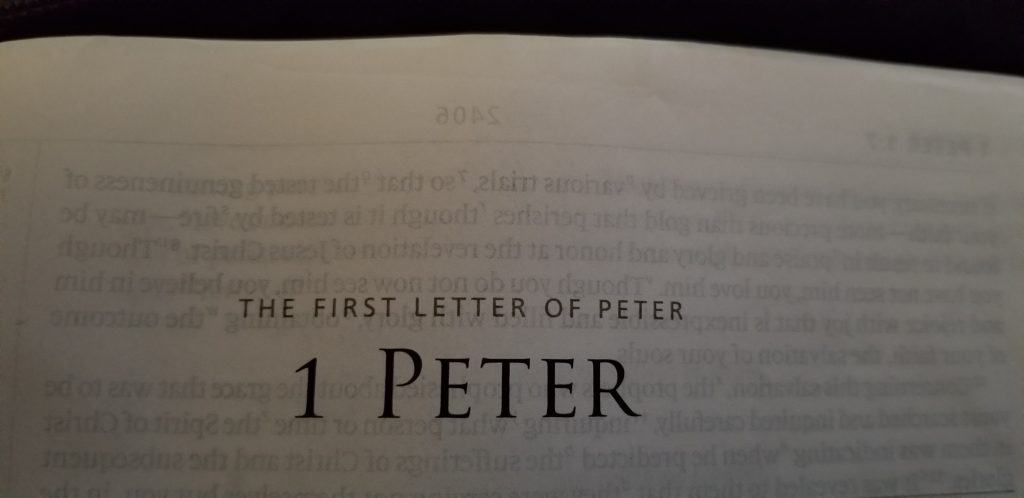⏱️ Estimated Reading Time: 5 min read
1 Peter 3:13-17, “13 Now who is there to harm you if you are zealous for what is good? 14 But even if you should suffer for righteousness’ sake, you will be blessed. Have no fear of them, nor be troubled, 15 but in your hearts honor Christ the Lord as holy, always being prepared to make a defense to anyone who asks you for a reason for the hope that is in you; yet do it with gentleness and respect, 16 having a good conscience, so that, when you are slandered, those who revile your good behavior in Christ may be put to shame. 17 For it is better to suffer for doing good, if that should be God’s will, than for doing evil.”
How quick are you on your feet? I know I am not that quick on my feet. It is part of the reason why I was never really comfortable to be up in front of people. God, in His sense of humor, thought it would be good to make me a pastor. So, I have had to improve in this area, but the best way that I have found to improve is to be as prepared as I can be. For me, this means that I read and study a lot, then think and meditate a lot on what I read and study. Perhaps being quick on your feet is less a product of being quick with words and more a product of disciplined preparation. For the follower of Jesus, we see there is a preparation for godly suffering, a preparation for godly hope, and a preparation for godly communication.
In chapters 2-3, Peter addresses a few scenarios in which followers of Jesus are to submit, even if the authority is not godly. We are to submit to governing authorities, work authorities, as well as family roles as directed by God. In each case, there is the likelihood that this will result in unjust suffering, with unjust meaning that the suffering is in spite of righteous behavior. In this text, Peter directs his readers to prepare themselves for these moments. In doing so, he quotes from Isaiah 8:12, “have no fear of them.” From the context in Isaiah we see it says to do a few things in conjunction or in preparation to have no fear. This includes: not walking in the way of wicked people, not calling conspiracy, and not fearing what they fear. Instead, they are to set apart God as holy and to fear God instead. There is a lot that people can do to us, but it pales in comparison to what God can do. We are to fear God, not them. We prepare for suffering by remembering the God who is holy.
Not only is there preparation for suffering, but there is also a preparation for godly hope. A familiar verse to many is 1 Peter 3:15 in which Peter tells us to be ready to give a defense for the hope within us. It is the Greek word from which we get the word “apologetics,” or the defense of the Christian faith. In Peter’s context, there is much slandering of Christians by non-Christians, in many cases leading directly to some of this unjust suffering. At times, the Christians can feel as though they are losing the battle. However, we are called to be prepared to give a defense as to why we have hope. Giving a defense can often be seen as an attempt to convince someone of the truth, but, perhaps it is just as fitting that we rehearse in our own minds the truth about the hope we have. I often tell people who are going through difficult time or difficult relationships to look for God in the midst of it all. God is working, but we often have to remind ourselves that it is true. So, apologetics can be helpful in both inward and outward directions, reminding us of the hope we have in Jesus.
Finally, there is preparation for godly communication. The charge is sometimes accurate that Christians can be harsh in their communication, even in sharing the truth of the gospel or teaching doctrine. There is a disconnect in that the greatest demonstration of love, the sacrificial death of Jesus for the penalty of sin, can be communicated in a way that shows almost no love whatsoever. In our communication of the hope that is within us, we are further reminded that we are to do so with gentleness and respect.
If you have ever spent time in a toddler nursery at church, you know there is often some spirited competition over the toys. On some occasions, one of the precious little ones will act in a not so precious way and attempt to use whatever force they have to free the toy from the opposing toddler. When my wife and I worked in the nursery, we would often remind the boys or girls to be gentle with each other. The reminder is true also for Christians who are prone to be just like the toddler with the toys. We are called to be gentle in our sharing of truth, being respectful of the other person as an image bearer of God. In doing so, we evidence that our hope is not in our strength, either physical or mental, but in the God who made us and redeemed us. He is the true hope; we just have to remember it.




